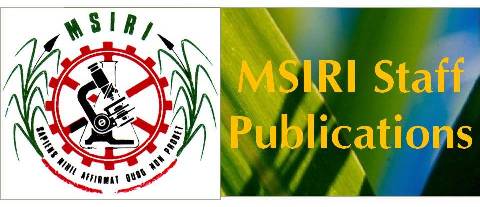Changes in soil organic carbon stocks resulting from sugarcane cropping in the humid tropical climate of Mauritius: results from 13c natural abundance
| MSI10P4459 | |
| Umrit, G Ng Kee Kwong, K F Ng Cheong, L R Bholah, M A Merckx, R | |
| Changes in soil organic carbon stocks resulting from sugarcane cropping in the humid tropical climate of Mauritius: results from 13c natural abundance | |
| periodical article | |
| 2010 | |
| Proc. int. Soc. Sug. Cane Technol. | |
| 27: 13 p. | |
| En | |
| En | |
| A decline in productive capacity of soils as a consequence of long-term sugarcane monoculture, combined with an intensification of the production system, has become a major issue in several sugarcane producing countries. Maintenance of adequate levels of soil organic carbon (SOC) is crucial for the biological, chemical and physical functioning of soils. This study was conducted to determine the impact of long-term sugarcane monoculture on SOC stocks and to quantify the loss of native SOC and accretion of sugarcane-derived C following the adoption of new management practices namely derocking/landgrading and mechanised harvesting. Five study sites representing the five major soil groups under sugarcane in Mauritius were studied and a classical 'paired-plot' design was adopted where two sites with similar starting conditions were developed in different ways over time, with one representing the reference soil (virgin land with predominantly C3 type vegetation) and the other representing the following cropping treatments: (i) fields continuously cultivated with sugarcane for more than 25 or 50 years without derocking or land grading, (ii) fields under long-term sugarcane but having undergone derocking and land grading for mechanised harvesting in the last 3 years. Soil samples were taken to a depth of 50 cm and analysed for total organic C, 13C abundance, bulk density and stone content. Long-term sugarcane cultivation reduced SOC stocks in the surface 0-15 cm layer compared to uncultivated virgin soil but increased subsoil organic C indicating a redistribution of SOC in the deeper layers of the soil profile. Changes in total C stock in the 0-50 cm profile, following 50 years of cane cropping were not significant (P< 0.05) compared to virgin land at any site. Data from 13C abundance measurements revealed that long-term sugarcane cultivation in fact resulted in a depletion of original SOC by 34 to 70 per cent. However, this loss was fully compensated by C input from sugarcane residues at all sites studied, resulting in no net change in SOC stock. Moreover, adoption of mechanised cropping, which entails intensive derocking and land grading, did not have any detrimental effect on SOC stocks due to C inputs from crop residues. | |
| soil organic carbon Delta 13C sustainable sugarcane production soil quality cultural practices derocking mechanization sugarcane soils sugarcane | |
| Mauritius | |
| Sugarcane: Soils and plant nutrition | |
| Soils | |
| 2010-03-17 | |
| EN | |
| LIB | |
| CAT | |
| CHEM |
